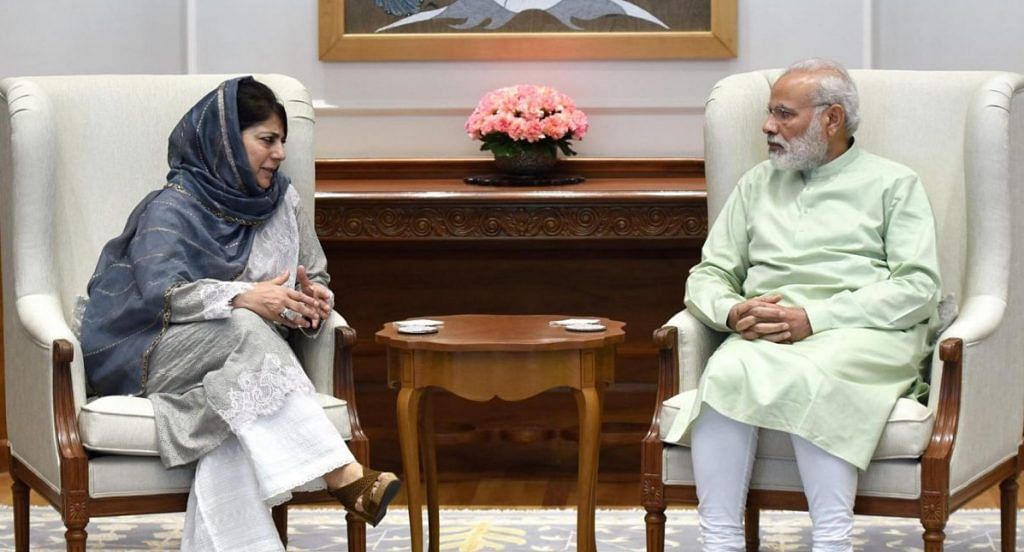BJP walked out of the alliance because people in Jammu were critical of it for bending over backwards to stay in power with PDP.
Announcing the end of his party’s four-year-old bitter-sweet relationship with the PDP, BJP general secretary Ram Madhav took the grandstand that the decision was taken “keeping in mind that Jammu and Kashmir is an integral part of India and in order to control the prevailing situation in the state, we (the BJP) have decided that the reins of power in the state should be handed over to the governor”.
That is a complete distortion of the real picture. The decision to pull out of the alliance is as opportunistic as joining it was.
The BJP has walked out because it realised that the ground was fast slipping from beneath its feet, and its ill-conceived Eid ceasefire plan proved to be a big mistake.
It walked out because people in Jammu were critical of it for what they perceived as bending over backwards to stay in power with the PDP.
The party walked out because the Kashmir issue was now becoming an albatross around its neck, threatening to spoil its 2019 Lok Sabha election plans.
One can safely expect the BJP to put today’s decision – taking the claim that it left power for the sake of the country – at the centre of its 2019 campaign.
While things started going downhill for the BJP within days of it becoming part of the Mufti Mohammad Sayeed government, the real trouble began two months ago after the alleged gangrape-cum-murder of an eight-year-old girl in Kathua. Under fire for the support that two of its (now-dumped) ministers Lal Singh and Chander Prakash Ganga and some MLAs extended to the Kathua rape accused, the BJP tried to minimise the damage – by sacking them and getting Mehbooba to reshuffle her ministry.
However, this move too backfired, with Lal Singh going on the offensive and taking out a big rally and following it with up mega rallies. The huge crowds that came to hear Lal Singh, who mostly criticised the PDP, were a grim reminder to the saffron party, which had won 25 seats in the last assembly elections, that the people of Jammu were no longer ready to follow it.
There were also indications that Lal Singh and several other BJP leaders were planning to set up a regional party, which would raise the rights and interests of the people of Jammu. This would have hurt the BJP nationally, harder than even its inability to form the government in Karnataka.
While the timing of the move has taken many, including leaders in the PDP, by surprise, the BJP possibly didn’t want to wait till the PDP pulled the plug. And, yes, it is an open secret that the PDP was waiting for an opportune moment to walk out of the alliance so as to send a signal to its constituency that it left power for the sake of Kashmir.
The possibility of that happening soon is what forced the BJP’s hand.
Also, with the security situation in the Valley hitting a new low every passing day, the Amarnath Yatra would have thrown several challenges at the state government. Even a single attack by militants or a bomb blast at the yatris would have dealt a major blow to Narendra Modi government’s claim that it has blunted the capabilities of the militants to strike at will.
What is, however, surprising is that despite its repeated claims that its leadership has perfected the art of reading the tea leaves (mind of the voters in today’s context), the BJP took almost four years to come to the conclusion, which was so apparent to all. The alliance was only hurting it.
So much for the chanakyas that the BJP has!
What next: With no compulsion of keeping the PDP happy — Mufti was perceived as being soft on separatists — the BJP can now be expected to put its avowed muscular policy into practice.
Jammu and Kashmir governor N.N. Vohra is an able administrator, who can be expected to hold the ship steady during the ensuing Amarnath Yatra. But, improving the security situation is something in which the Centre’s role will be more important than that of the state administration.
Too much muscular policy — strong-arm measures to crush the growing activities of the militants — may get the BJP the votes in 2019, but it risks Kashmir becoming a lost cause forever.
The BJP must give the governor a free hand to check the growing alienation of the people of Jammu and Kashmir, especially by finally holding the much-delayed panchayat and local body elections, and allow real grassroots democracy to return.
Will it do that? It appears very doubtful.
One thing that looks likely is that the Centre will get more involved in the ongoing case in the Supreme Court on whether the special status granted to Jammu and Kashmir through Article 35A is unconstitutional. On 6 August, the Supreme Court begins hearing the plea for referring the matter to a Constitution bench.
This important clause gives the state assembly the right to be the sole arbiter on who is a permanent resident of the state, granting special rights and privileges to such people.
Only time will tell if the BJP played its hand better than its alliance partner or the people of Jammu refuse to buy this so-called smart move.
